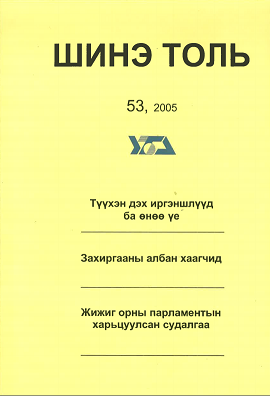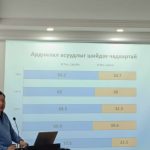![]()
Dong-Jin Jang
Шинэ толь №53, 2005
Korean democracy faces new problems never considered seriously before. These are often called “problems of Korean democracy after democratization”. It is generally recognized that Korea has achieved its democratization in the institutional sense through the June 29 declaration in 1987. The declaration was promulgated for guaranteeing the direct election for presidency again, which had been suspended for a considerable period of time. The problems in democratic consolidation in Korea seem to be closely linked with the problems of moral disagreement (or reasonable disagreement) and civic privatism in modern liberal democracy that deliberative democracy theorists try to overcome.
The so-called democratic problems after democratization in Korea cover individual privatism, deepening of social-economic conflicts such as group egoism, emotive regionalism and regional egoism, along with ideological conflicts of progressive-conservative discourses, diversification of personal beliefs, spreading of feminism discourse in theory and movement and the initial stage of multi-culturalism. There is an increasing concern that these problems undermine the grounds for stability and the common good of Korean society. These problems beg the question associated with modern deliberative democracy such as overcoming civic privatism and moral disagreement
Deliberative democracy attempts to combine reasoned discussion with democratic decision-making process. Reasoned discussion requires public justification which demands public reasonability. Although reasoned discussion is expected to confront many difficulties in curing the so-called Korean problems after democratization, it may be highly pragmatic to search for some clues in the ideas of deliberative democracy for solving the democratic problems of Korea in the beginning of the 21th century. But an implementation of deliberative democracy in the current Korean context will be a long journey in which the Korean people are required to wrestle with many problems. A Korean implementation of deliberative democracy is expected to have its limited success within the constraints of Korean context.
However, whereas its experiment is demanded for sustainable democracy in Korea, deliberative democracy has not been fully tested in Korea. We can apply deliberative democracy to Korea in two ways, indirect and direct. On the one hand, a variety of indirect ways are currently implemented through the programs of NGOs, college or university education, discussion-centric programs in TV. Public discussions on political issues have recently increased through various channels or organizations, which indirectly influence political decisions or elections. However, it is not easy to discern how and to what extent those indirect public discussions affect democratic political decisions. Nonetheless, a variety of public discussions, newly emerging through various organizations and social networks, are expected to provide cultural grounds for practicing deliberative democracy in Korea.
On the other hand, we do not witness that a direct implementation of deliberative democracy in the democratic decision-making has yet been experimented. We may again further examine the possibility of direct experiment in two ways, full-scale and partial. The full-scale approach means that the Korean government can nationally provide an official deliberation opportunity for citizens on a proper day before elections not only for president or national assembly members elections but also for the heads of local government and local assembly members. In other words, the government should manage a nation-wide deliberation program such as “Deliberation Day” proposed by Bruce Ackerman and James S. Fishkin. However, this approach may trigger severe controversies of the pros and the cons. Above all, a negative response would be that a government-led deliberation program dooms to fail in inducing voluntary public discussions. Another serious problem is expectedly enormous external costs required for nation-wide public deliberation. Combining these two responses, a nation-wide public deliberation by the government would bring about a less satisfactory effect compared to its enormous costs. Also there is a danger that the full-scale approach by government may be distorted or misused by political intention.
The other direct approach is partial. The partial approach can be initiated by a variety of non-governmental organizations in civil society. They can offer programs for public discussion in a certain place and at a certain time for periodical elections or specific policy. This approach can be implemented partially, not in a national full- scale. This approach has a positive meaning because individuals and organizations in civil society carry out public deliberation voluntarily. However, it would not be highly effective on political decision and voting due to limited voluntary participation. In other words, only those having a decent level of economic and intellectual capability are likely to participate in deliberation programs organized by non-governmental organizations or agencies. Such limited scope of participants may influence the scope of agenda and characteristics of deliberation. On the other hand, the characteristics of deliberation and participants would largely depend upon who organizes deliberation programs. For example, when a more conservative civil organization organizes the deliberation program, the participants and their deliberations are likely to be mostly conservative-oriented. They may try to justify their conservative positions, thus more critical of progressive positions. In contrast, when a more progressive organization host a deliberation program, we expect an opposite tendency in public discussion. This situation may undermine the public reasonableness of deliberation that deliberative democracy aims to enhance. Nevertheless, from a perspective of Korean people as a whole, these sporadically dispersed public discussions, though incompatible and contradictory, may contribute to helping people have balanced views on specific policies or candidates.
Despite a possibility that an experimentation of deliberative democracy can contribute positively to Korean democracy, we have to yet examine whether this deliberative experimentation is compatible with existing forms of Korean culture. This cultural thesis tells that in Korean culture, when one expresses his/her own political views on specific political issues, he/she may confront political and moral pressures in social human relations. Such culture deter people from participating in public discussions. Even if they participate in public deliberation, they may avoid extreme confrontation of opinions by using neutral, ambiguous or equivocal expressions rather than advancing clear positions. In this cultural context, we may not easily anticipate a significant effect of public deliberation. Futhermore, Korean human relations or networks bonded by affection may hinder pursuing public reasonability. It is worth noting that in the Korean culture it is not easy for one to advance her own political views contrary to or irrespective of the interests of her own affectionate networks, organizations or parties. These arguments are summarized into the cultural thesis.
More fundamental problems is inherent in deliberative democracy in itself. In theory, as mentioned above, deliberative democracy attempts to combine reasoned discussions with political decisions. Fundamentally speaking, it is arguable that reasoned discussions have nothing to do with democratic decisions in practice. While reasoned discussions demand public reasonableness, decision-making through practical voting can hardly abandon individual or group interests. There is much room in modern democracy that citizens and their representatives can cast ballots contrary to what they defended in public discussions. Modern democracy hardly finds effective measures democratically to prevent rampant political behaviors of “discussion for discussion, voting for voting”. This situation can happen in any place and at any time in Korean democracy. This theoretical dilemma can be easily combined with not only social-economic constraints but also cultural forms. Citizens are constrained in pursuing public leness through discussions by their own social, economic and political status. Even if permitted to defend their own political views, they may not be permitted to vote for their own views in practice contrary to the interests or views of their own groups or parties. This means that deliberative democracy can be constrained by social positions or networks. Futhermore, there is a danger that the theoretical defect of deliberative democracy can be fused with the Korean cultural forms to make Korean experimentation of deliberative democracy difficult.
As analyzed above, we found a number of possible constraints and limitations in experimenting deliberative democracy in Korea. Nevertheless, we can not expect that ‘democratic problems after democratization can be overcome only by elaborating political systems and enhancing political leadership. The current problems in Korean democracy has a great deal with the problems of reasonable disagreement and civic privatism that contemporary western democracy is now facing. In order to overcome the current difficulties in practicing democracy, there is no other plausible solution but introducing the ideas of deliberative democracy to Korean politics. A Korean experiment of deliberative democracy should proceed with partial approach through non-governmental organizations and agencies, not by the government-initiating nationwide approach. Of course, we may confront many unexpected difficulties as well as problems enumerated above. These difficulties and problems, expected or unexpected, do not justify that we should give up a Korean experiment of deliberative democracy. Rather, those difficulties and problems are merely the huddles to jump over in the process of successfully implementing deliberative democracy for upgrading Korean politics. As having undergone many difficulties in establishing democratic institutions in Korea, we shall face many expected and unexpected difficulties in successfully implementing deliberative democracy for the next stage of Korean democracy. It seems apparent that public discussions, though insufficiently proceeding within the constraints of reality, contribute to empowering the democratic capability of citizens, and further to enlarging the politics of public good.






